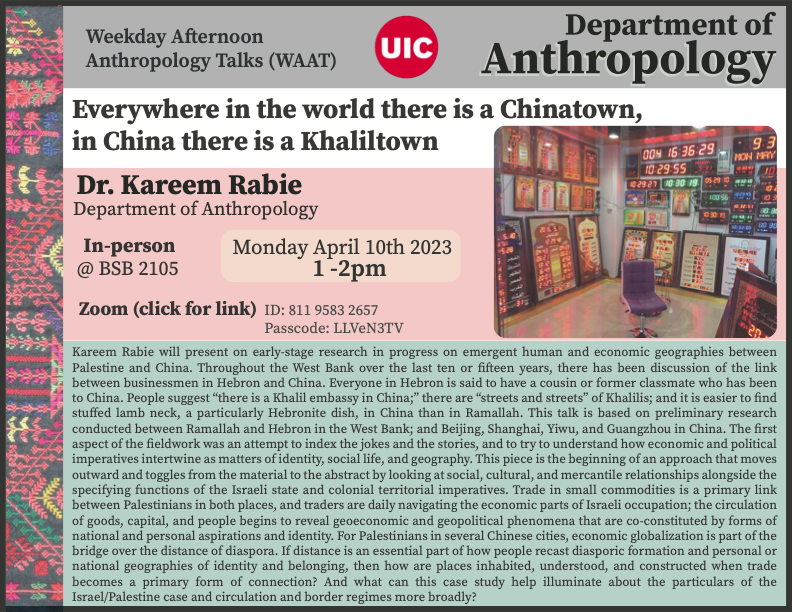WAAT: “Everywhere in the world there is a Chinatown, in China there is a Khaliltown” by Dr. Kareem Rabie
Weekday Afternoon Anthropology Talk (WAAT)
April 10, 2023
1:00 PM - 2:00 PM
Location
BSB 2105 and on Zoom
Calendar
Download iCal File
Kareem Rabie will present on early-stage research in progress on emergent human and economic geographies between Palestine and China. Throughout the West Bank over the last ten or fifteen years, there has been discussion of the link between businessmen in Hebron and China. Everyone in Hebron is said to have a cousin or former classmate who has been to China. People suggest “there is a Khalil embassy in China;” there are “streets and streets” of Khalilis; and it is easier to find stuffed lamb neck, a particularly Hebronite dish, in China than in Ramallah. This talk is based on preliminary research conducted between Ramallah and Hebron in the West Bank; and Beijing, Shanghai, Yiwu, and Guangzhou in China. The first aspect of the fieldwork was an attempt to index the jokes and the stories, and to try to understand how economic and political imperatives intertwine as matters of identity, social life, and geography. This piece is the beginning of an approach that moves outward and toggles from the material to the abstract by looking at social, cultural, and mercantile relationships alongside the specifying functions of the Israeli state and colonial territorial imperatives. Trade in small commodities is a primary link between Palestinians in both places, and traders are daily navigating the economic parts of Israeli occupation; the circulation of goods, capital, and people begins to reveal geoeconomic and geopolitical phenomena that are co-constituted by forms of national and personal aspirations and identity. For Palestinians in several Chinese cities, economic globalization is part of the bridge over the distance of diaspora. If distance is an essential part of how people recast diasporic formation and personal or national geographies of identity and belonging, then how are places inhabited, understood, and constructed when trade becomes a primary form of connection? And what can this case study help illuminate about the particulars of the Israel/Palestine case and circulation and border regimes more broadly?
Date posted
Apr 4, 2023
Date updated
Apr 4, 2023